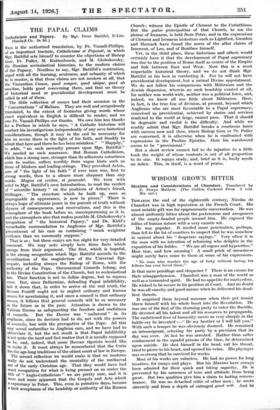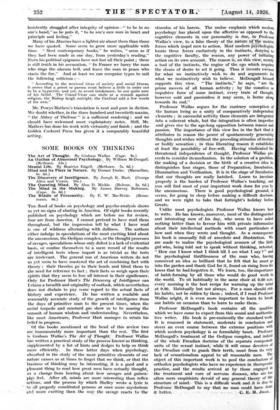WISDOM GROWN BITTER
TOWARDS the end of the eighteenth century, Nicolas de
Chamfort was in high reputation at the French Court. His most notable gift was for epigrammatic conversation. He was
almost uniformly bitter about the pretensions and arrogances of the empty-headed people around him. He exposed the
follies of human nature with a very caustic wit. •
He was popular. It needed more penetration, perhaps, than fell to the lot of courtiers to suspect that he was somehow in earnest about his " desperate sayings." Very often it is the man with no intention of reforming who delights in the exposition of his foibles. " We arc all rogues and hypocrites." How true, and how amusing ! A small prick of uneasiness might surely have come to them at some of his expressions.
" No man who reaches the age of forty without hating his fellows has ever loved them."
Is that mere persiflage and eloquence ? There is an excuse for their misapprehension. Chamfort was a man of the world as well as a tormented spirit. He had no appetite for martyrdom. He wished to be secure in his position at Court. And no doubt he was all suavity and good-nature when he delivered his dead- liest thrusts.
It surprised them beyond measure when their pet ironist threw himself with his whole heart into the Revolution. He was one of the first of the storming party to enter the Bastille. He devoted all his talent and all his resources to propaganda. The embittered love of humanity meets us very sharply in the battle-cry he invented :—" Be my brother or I will kill you." . With such a temper he was obviously doomed. He remained an intransigeant,. selecting his party by a prevision that its day was over. At last he was arrested. Rather than suffer confinement in the squalid prisons of the time, he determined upon suicide. He shot himself in the head, cut his throat, tried to pierce to his heart, and opened his veins. His physique was so strong that he survived for weeks.
Most of his works are valueless. He had no power for long treatises, for essaya and plays. But his Maxims have always been admired for their quick and biting sagacity. He is prevented by his sameness of tone and attitude from being great. But two qualities give him a claim to lasting remem-
brance. He was no detached critic of other men,; he wrote
sincerely and from a depth of outraged good _ And he
insistently struggled- after integrity of opinion—" to be-in no one's hand," as he puts it, "to be ones own man in- heart and principle and feeling." .
Many of his Maxims have a lighter air about them than those we have quoted. Some seem to grow more applicable with time. " Most contemporary books," he writes, " seem as if they had- been made in one day, from yesterday's reading." Even his political-epigrams have not lost all their point ; there is still truth in his accusation, " In France we harry the man who rings the alarum bell, and leave the man in peace who starts the fire." And at least we can recognize types to suit the following criticism :-
"According to the received ideas of society and social fitness, it seems that a priest. or parson must believe a little in order not to be a hypocrite, and yet, to avoid intolerance, be not quite sure of his belief. The Grand-Vicar, can smile at a remark against religion, the Bishop laugh outright, the Cardinal add a few words
of his own." •
Mr. Powys Mothers's translation is neat and pure in diction. We doubt whether, in the three hundred and twentieth maxim, " the Abbey of Theleme " is a sufficient rendering ; and we
should have welcomed more explanatory notes. Still, Mr. :Mothers has done his work with virtuosity, and finish ; and the Golden Cockerel Press has given it a cOmparably beiutiful setting,



































 Previous page
Previous page